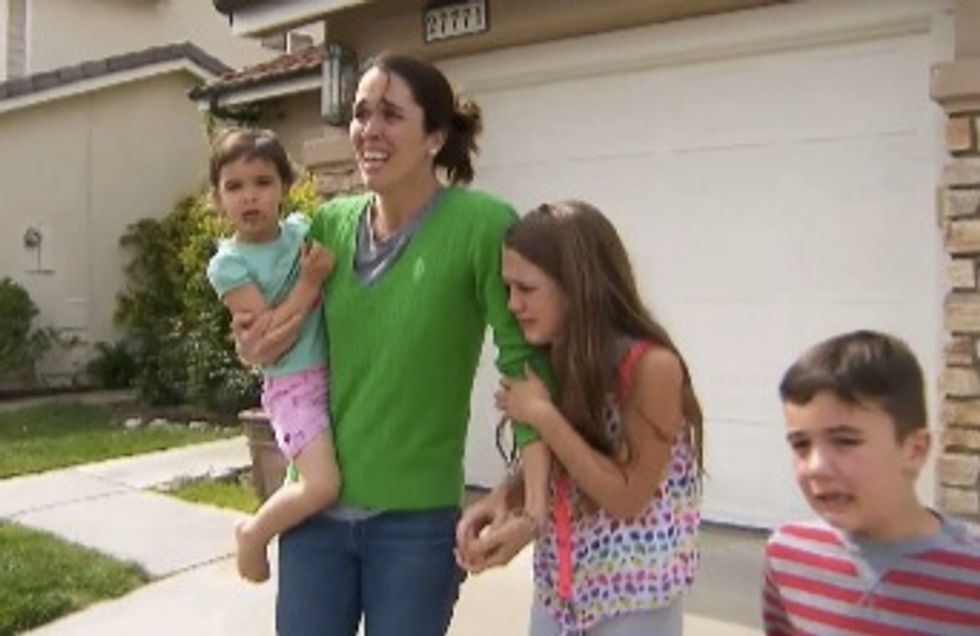
© 2024 Blaze Media LLC. All rights reserved.
Ex-Social Worker for 6-Year-Old Girl Who Was Seized From Her Longtime Foster Home Because She Is One-and-a-Half Percent Native American Reveals Her 'Biggest Shock
March 28, 2016
"It's going to cause such a detrimental trauma."
The former social worker for a 6-year-old girl who is one-and-a-half percent Choctaw Native American and was recently removed from her longtime foster home due to a 1978 federal law mandating that “Indian children” be raised by Native Americans, is speaking out.
Lauren Axline, who said that she managed Lexi's case while working for the Olive Crest foster agency from 2010-2015, told TheBlaze in a series of interviews that she is dumbfounded and shocked by the way in which Los Angeles County Department of Children and Family Services chose to go about seizing the little girl from the home of foster parents Rusty and Summer Page.
"The biggest shock is how the county has gone and continues to go about doing this," Axline told TheBlaze. "We have been advocating ... for Lexi's best interest and they've had more than enough opportunities to do what was right for Lexi, specifically, not for the tribe in general or for anything else, but to look at the child in particular and her specific needs and her specific situation and to make a decision based on that."
It was a scene that left left Axline both confounded and troubled.
"Even the way that they went about taking her was so surprising to me, because, clinically speaking, that is the worst way that you can ever do any situation like this," she said. "Because it's going to cause such a detrimental trauma and we have been telling them this stuff for years."
The battle over Lexi's case is quite complex, with the 1978 Indian Child Welfare Act coming into the mix — an act that Axline believes is being misapplied in this particular case. The provision was signed into law to “establish standards for the placement of Indian children in foster or adoptive homes, to prevent the breakup of Indian families, and for other purposes.”
The Pages are reportedly the only parents Lexi has ever known, as she had been living with them for more than four years. The family has been reportedly trying to adopt her for the past two-and-a-half years — something that Axline said would have happened right away if not for the legal hurdles surrounding the Indian Child Welfare Act.
"In the foster realm, everyone knows that Native cases are really difficult. It's really difficult to really fight for what's in the best interest of the child," the former social worker said. "This is only just an example ... of hundreds and hundreds of cases that have occurred with children that are just like this."
As for the Indian Child Welfare Act, Axline said that she believes that the law was put in place for a good reason and that she doesn't disagree with its initial intent, specifically when it comes to protecting Indian children living on reservations.
"I think that if you are living on a reservation, when you have that culture and you have a heritage and you have those native families that you are living with on the reservation, that those kids should be staying there if they can," she said. "But I think that it is grossly misused now."
The social worker described the Page family as "one of the best families" that her former agency had ever worked with, saying that Rusty and Summer Page truly care for the children they take in. Adoption, she said, was never the initial aim for the Pages, as they simply wanted to help kids in need of a caring home.
"It was only after [Lexi] had been with them for years that she was attached to them and [Summer and Rusty realized] it would be a detriment to remove her from them," Axline continued. "It was the only reason they fought, and because of all of the deceptive things that have been occurring with the county workers."
Axline said that she can only speculate about why the Los Angeles County Department of Children and Family Services seized Lexi, but that there is no definitive evidence to back any of the theories floating around.
In the end, regardless of the reasons, after spending more than three years working with Lexi and her family, Axline said that the child's specific needs in this case as well as the trauma that she had faced previously and the additional trauma that she would face in light of her removal were not properly taken into account.
"The Page family ... they were the ones that were able to instill in her stability and instilling in her the love," Axline said, explaining that Lexi was flourishing inside of their home.
But the National Indian Child Welfare Association, an Indian child welfare group, released a statement last Tuesday supporting Lexi’s move to Utah to be with her extended relatives, saying that, though the organization has “deep sympathy for what the Page family,” its leaders are disturbed by the “media spectacle” surrounding the case.
“Court transcripts indicate the Pages were aware since 2011 that their foster daughter had loving relatives wanting to welcome her into their home and reunite her with her siblings, one of whom she will now live with,” the statement read. “As with most foster placements, where reunification with family is the stated objective, the Page family understood her placement was to be temporary.”
It continued, “Despite this and numerous court rulings dating back to 2013, they chose to reject the consensus of the court, the county child welfare agency, the child’s parent, her court-appointed attorney, and her tribe, who all agreed it was in her best interest to be with family.”
Leslie Heimov, executive director of the Children’s Law Center of California — the group that has been court appointed to represent Lexi — said that the Utah family members aren’t strangers and have been in touch with the child over the past three years both in person and via Skype, the Associated Press reported.
“She has a loving relationship with them,” Heimov told the Los Angeles Daily News. “They are not strangers in any way, shape or form. … The law defines family based on marriage, affinity or blood.”
The Choctaw tribe also issued statements and information about the custody battle to TheBlaze, saying that the case has been heard by three different trial judges in the California court system and "every time the California courts found it is in Lexi’s best interest to go to family."
"The foster home family delayed Lexi’s reunification with her family by filing appeals. The appeals are what delayed permanency," read bullet points from the tribe. "Lexi’s family will provide her a safe, stable and nurturing home to grow up with her biological sisters and to have contact with her extensive extended family. A loving family is embracing her."
But Axline claimed that there's an additional and related element of the case that she found troubling, saying that reports that she had been filing with the county about Lexi's reactions to some of these visits with the Utah relatives never made their way into the hands of the judges who were presiding over Levi's case.
"She was crying and she was telling them and she was telling me, 'I don't want to go. I'm scared,'" Axline said. "'I don't want to go,' hysterically crying."
Listen to Rusty Page discuss his family's harrowing ordeal below:
The social worker said that she believes that the county intentionally withheld the information about purported struggles that Lexi had during certain Utah visits, instead purportedly concealing those details and declining to include them in official documentation.
"The thing about the Pages is they're such upstanding people that throughout this whole time they really, really want what's best for Lexi," Axline said. "And even through that they were so positive about her visit, trying to help her have a fun time like, ''We know that you're gonna enjoy your time when you're there. We will see you when you come back.'"
She said that she's speaking out in the wake of Lexi's removal from the home, as she believes that an injustice has been served, especially considering her contention that Lexi considers the Pages her parents and their biological children her siblings.
While Neil Zanville, a spokesman with the Los Angeles County Department of Children and Family Services, told TheBlaze that his office cannot speak about specific cases, he said that the department "always moves in the best interest" of its children and that it has an American Indian unit that handles cases involving Native American children.
"Anytime we find a relative that is available and we do family finding ... if we find a family that readily wants to connect with a child, that is done as quickly as possible," Zanville explained, saying that any major moves and transitions for a child must be approved by a juvenile court.
And while Zanville couldn't speak specifically to the media spectacle surrounding Lexi's case, he said, "It's always our intention never to have any kind of a media staging when there's a sensitive move from foster placement."
The battle over Lexi is likely nowhere near over, with the Page family appealing to the California Supreme Court in an effort to gain custody of the little girl. In the meantime, there's a continued battle raging over the narrative surrounding the case.
For instance: After the Choctaw tribe released a statement last week saying that the Page family was aware from the beginning of Lexi's case that the "goal was for Lexi to have a permanent home" with the extended Utah family and that her presence with the Pages was merely temporary, the foster family issued a response to TheBlaze.
"In many cases, foster care is temporary but that is not always the case. As a matter of fact, many foster care placement become permanent placements through adoption in order to provide a child with a stable, loving, permanent family," the Page family statement read. "To suggest that foster care is always temporary is simply not true. If fact, many families foster to adopt and while we did sign up to be foster parents, Lexi did not sign up to be a foster child."
The text continued, "The Choctaw Nation and LA County DCFS both placed Lexi with us with no plan to remove her until reunification was complete. By the time reunification services were terminated, Lexi was deeply bonded and attached to our family."
The Pages said that, if it were not for the Indian Child Welfare Act, they would have adopted Lexi three years ago.
--
Follow the author of this story on Twitter and Facebook:
Want to leave a tip?
We answer to you. Help keep our content free of advertisers and big tech censorship by leaving a tip today.
Want to join the conversation?
Already a subscriber?
Billy Hallowell is a digital TV host and interviewer for Faithwire and CBN News and the co-host of CBN’s "Quick Start Podcast."
Billy Hallowell
Billy Hallowell is a digital TV host and interviewer for Faithwire and CBN News and the co-host of CBN’s "Quick Start Podcast."
more stories
Sign up for the Blaze newsletter
By signing up, you agree to our Privacy Policy and Terms of Use, and agree to receive content that may sometimes include advertisements. You may opt out at any time.
© 2024 Blaze Media LLC. All rights reserved.
Get the stories that matter most delivered directly to your inbox.
By signing up, you agree to our Privacy Policy and Terms of Use, and agree to receive content that may sometimes include advertisements. You may opt out at any time.


